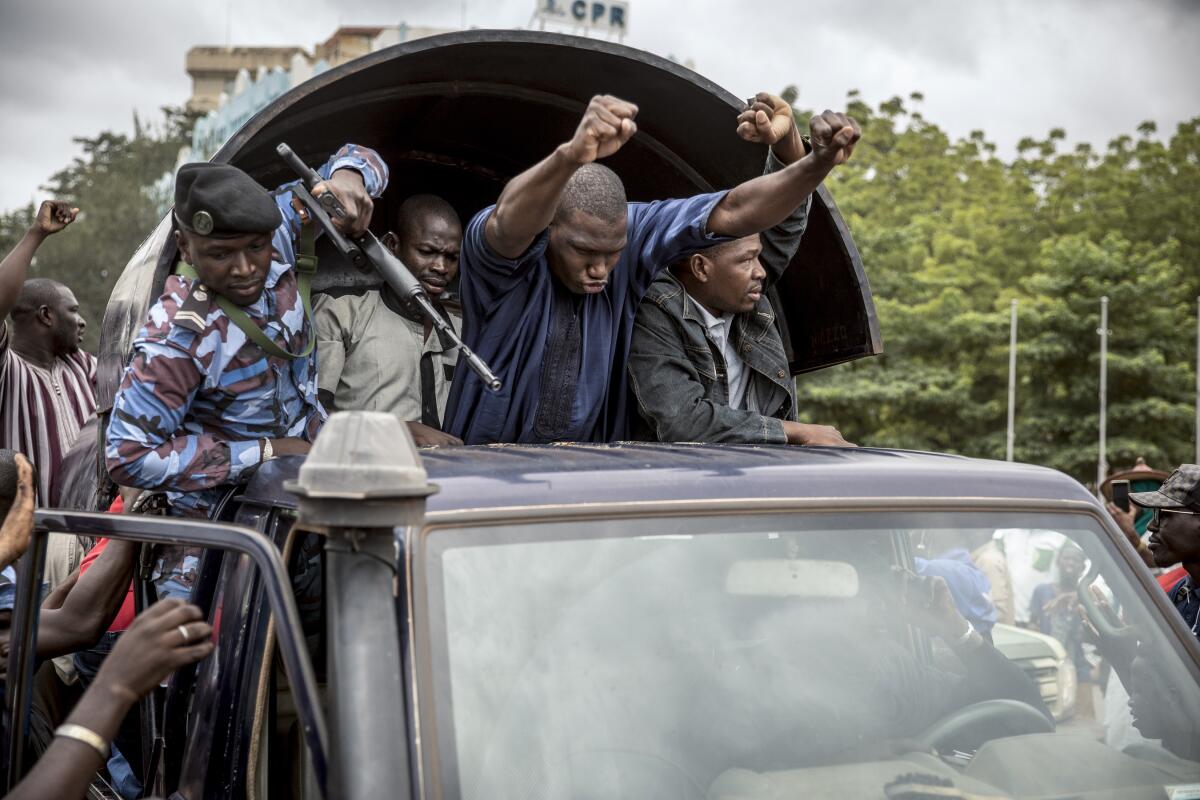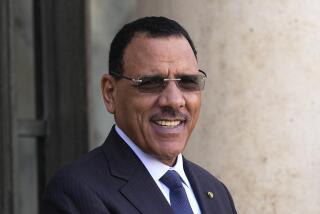A look at how Mali’s coup may affect neighboring countries in West Africa

- Share via
DAKAR, Senegal — African and Western leaders have condemned the junta that forced Mali’s president from power, warning the coup was a deep setback that could threaten the battle against Islamic extremism across the Sahel region, where thousands have been killed by jihadists.
The West African economic bloc, known as ECOWAS, held a virtual extraordinary summit Thursday on the situation in Mali after military leaders two days earlier pushed President Ibrahim Boubacar Keita from office.
Coups were on the decline in West Africa, and some fear that the removal of Mali’s elected president three years before the end of his term could set a dangerous precedent. A number of elections are set to be held later this year involving incumbents, including in Ivory Coast, Burkina Faso and Niger.
Here is a look at several countries in West Africa and the Sahel, the sprawling region south of the Sahara, that could be affected by increased instability in Mali:
MAURITANIA:
Mauritania shares a border with Mali, and already has received tens of thousands of refugees after Islamic militants seized large swaths of northern Mali back in 2012.
The two countries are part of the G5 Sahel regional force — along with Chad, Niger and Burkina Faso — which is trying to battle extremists across the Sahel. So far the coup leaders in Mali have pledged to maintain their international commitments, presumably to the G5, among others. However, Mali’s ousted president was among its most vocal supporters, and the force already has been plagued by a shortage of funds since its inception.
BURKINA FASO:
A record 1 million people already have been displaced by violence in Burkina Faso, nearly half of them this year, according to a recent report by the Norwegian Refugee Council. Observers fear those numbers could soar higher if the security situation deteriorates significantly in neighboring Mali.
Burkina Faso was long spared the kind of extremist violence seen across the border, but that has changed. The deterioration of Burkina Faso’s security situation began after President Blaise Compaore resigned amid a popular uprising in 2014 after ruling for nearly three decades. The Presidential Guard was dissolved after a failed coup against the transitional government, and security systems broke down.
In January 2016, Al Qaeda-linked militants believed to be from outside the country attacked a restaurant popular with foreigners in the capital of Ouagadougou, killing at least 30 people.
Other attacks have followed in the years since, and the violence has increasingly spread south and east. Now some analysts fear the jihadists have set their sights even farther, targeting borders with Benin, Togo and Ivory Coast.
Burkina Faso’s military is ill-equipped and under-trained, and, as the force targets civilians perceived to support the jihadists, accusations are mounting of extrajudicial killings, torture and unlawful detention.
CoupCast, a project of One Earth Future using historical data to predict the likelihood of a coup attempt, put Burkina Faso in the top 10 African countries likely to see a coup in last year’s report.
NIGER:
Niger also has a long, porous border with Mali, and the western border region already has seen some of the country’s worst extremist attacks — carried out by militants belonging to a group called the Islamic State in the Greater Sahara.
In 2017, Islamic extremists in western Niger killed four American service members who were helping Niger’s military battle extremists. At the time of the ambush, the forces were in pursuit of an Islamic extremist leader believed to have crossed over into Mali.
CoupCast also put Niger in the top 10 African countries likely to see a coup in its 2019 report.
IVORY COAST
Ivory Coast, West Africa’s economic powerhouse, has not seen a large-scale attack by Islamic extremists since March 2016, when Al Qaeda-linked militants killed at least 19 people at a beach resort. However, there have been growing concerns amid a number of attacks on security posts along the country’s northern border with Burkina Faso, including the biggest attack since 2016 that killed at least 14 troops on the border in June.
Things are also tense politically as the country’s president of nearly a decade, Alassane Ouattara, now says he will seek a third term in office. He has argued that his previous terms don’t count toward a two-term limit because of changes made to the constitution in 2016. Opposition and civil society groups are already calling on him to withdraw his candidacy, and Ouattara could be vulnerable to further efforts to block him from getting a third term.
More to Read
Sign up for Essential California
The most important California stories and recommendations in your inbox every morning.
You may occasionally receive promotional content from the Los Angeles Times.










